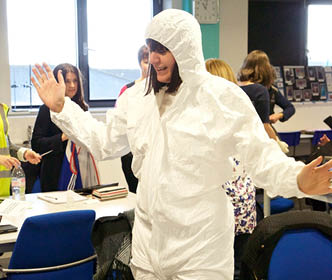
The profile of modern materials in textiles is becoming increasingly important particularly with the developments in the key stage 3 and 4 curriculum.
These changes reflect the changing nature of the textiles industry, with the UK becoming a world leader in textiles developments, and the resulting career opportunities this offers young people.
For some, teaching the science behind textiles can be a little bit daunting. However, for textiles teacher Maggie Brand, teaching her students about military textiles gave her the opportunity to open her students’ eyes to the difference that technical textiles makes to the real world. Read more about Maggie’s military textiles event here.
Real life examples of technical textiles are all around us and the new design and technology curriculum reflects the growth of technical textiles in its subject content. Non-traditional materials are being used more and more in textiles, such as polypropylene and carbon fibre, and textiles materials are now often being used to replace wood, metal and plastics, for example in geo-textiles and architecture.
These new materials, being used in products from fashion to architecture, allow us to combine more traditional techniques with newer production methods, creating exciting new opportunities for creativity.
If you are looking to find out more about technical textiles and gain ideas for teaching about them in the classroom, take a look at our two day bursary funded CPD. The course is run with support from Leeds Design School’s non-woven and medical textiles research groups and has lots of hands on creative activities across the two days.
Teachers who have attended previous courses have commented about the high quality resources and ideas that have enabled them to quickly start to embed technical textiles into the curriculum back in school. Many schools have also gone on to create their own STEM clubs as well as larger scale events such as STEM days.
